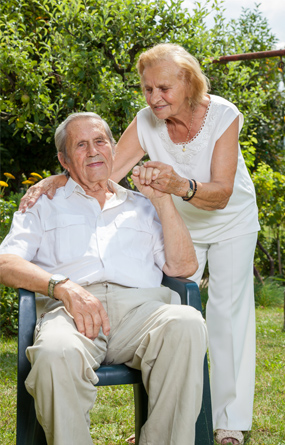 When a parent or spouse begins to require assistance with care, the natural place to look first is to family. Usually, the child or spouse wants to help, and the care required starts out by being limited and manageable. However, particularly in the case of a senior caregiver, it often grows to the point where it becomes overwhelming.
When a parent or spouse begins to require assistance with care, the natural place to look first is to family. Usually, the child or spouse wants to help, and the care required starts out by being limited and manageable. However, particularly in the case of a senior caregiver, it often grows to the point where it becomes overwhelming.
For example, if your husband needs a lot of help, it can become difficult or impossible for you to do things such as lift him, help him walk, or help him go to the bathroom. If he has dementia, it can become mentally exhausting to have to be with him at all times of the day or night.
The problems are often actually dangerous for an elderly caregiver spouse or partner. They may push to do more than they should. In addition to becoming depressed, the caregiver can actually become ill as well, from exhaustion or from excessive physical effort.
When a caregiver shows signs of depression or stress, or his or her health begins to deteriorate as a result of the stresses involved in caregiving, this is known as “caregiver burnout.” As WebMd states, “Caregivers often are so busy caring for others that they tend to neglect their own emotional, physical, and spiritual health.”
How can you avoid caregiver burnout? Getting support from friends and learning how to cope are part of the answer. In addition, if the ill person’s condition is chronic and progressive, as is frequently the case, it can be beneficial to both the ill person and his or her caregiver, to get outside help. If you as a caregiver become depressed or ill, you may no longer be able to provide any help to your spouse/partner, and that’s bad for both of you.
This can feel very difficult for the caregiver, for two main reasons. The first issue is that it can be hard to decide both what needs to be done, and how to find someone who you like, who will help you. The second issue is that it is very expensive to pay an aide; most people do not have enough extra income to be able to afford the help they need.
Regarding what help is needed and who should do it, we can look at my own family. We needed to find help for my mother-in-law. Did she need help with a) household chores; b) “Activities of Daily Living” such as bathing or dressing; or c) driving to her many doctors’ appointments? Could one person do all those things? How would we find someone who we would feel confident would be efficient, honest, caring and kind?
There is more than one option, but we turned to a Geriatric Care Manager. This is someone who assists with managing a senior’s care needs but does not do the work him- or herself. The GCM we found has a network of aides who she recommends and oversees. A home care agency can also do this work, but if you have only an aide, the aide may not be aware of all your needs. Another professional I met, who does accounting for household employees, also has a large group of aides he knows, who he can recommend. Our firm has relationships with a number of excellent area GCMs and other professionals who can assist you, if you need to begin to navigate this area.
My mother-in-law was at first very resistant to the idea of someone coming into her home. She was worried about hiring someone who was a stranger to her. The Geriatric Care Manager is a professional; she knew an aide personally already, who she knew would be a good fit for my mother-in-law. That eased my mother-in-law’s mind significantly.
Paying for assistance is also a significant issue for many people. Aides are expensive. Fortunately, help is available to almost everyone, particularly if you live in New York. Our state’s generous government assistance programs can be a literal life-saver. If your spouse needs assistance in your home, you can arrange your finances so that Medicaid will provide for his care. This is something we, as an Elder Law firm, help our clients do every day.
Medicaid has the right to make a claim for reimbursement of the amount that it paid to care for your spouse. The claim is subject to certain safeguards designed to protect the well spouse. Also, Medicaid’s claim, if one is made, can typically be negotiated. These are issues best discussed with an experienced New York Elder Law attorney.
Always remember that if you become depressed or ill, you are actually hurting, not helping, your loved one who needs assistance. Getting help in the home is possible for most people, and it helps not only you, but your loved one as well.
If you have any questions about this or other Elder Law topics, contact us today!
visit our key practice areas

